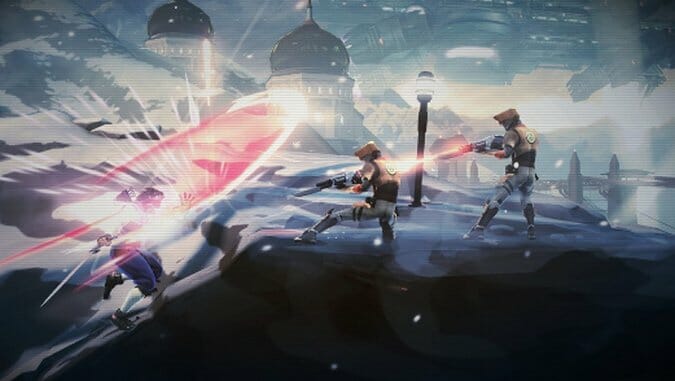Strider (Multi-Platform)

The quality of Double Helix’s Strider remake sits somewhere between Grin’s inventive and sharp stab at Bionic Commando and WayForward’s polished-but-dull DuckTales, layering a suite of clever new mechanics into what’s ultimately a lifeless remix of the classic action-adventure game. Visually impressive, lengthy and punishingly difficult on its default setting, Strider nonetheless succumbs to a less-than-memorable collection of levels and enemies, doing a disservice to what is, at times, a challenging and totally bonkers hack and explore experience.
Set in the fictional, oppressive regime of Kazakh, you take on the role of Strider (or the Strider—there have apparently been a few), as he battles the forces of Meio, blah blah, etc. For the first hour or so, Strider has very little time for its own story, and what there is of it is better left at the margins or ignored entirely.
Kazakh—above and below ground and in the sky—provides the playground for our hero as he slashes through a seemingly endless parade of mechanical enemies. Be prepared to take out hundreds of palette-swapped droids, drones, turrets, mechanical apes and spiders as the acrobatic Strider scales walls, leaps, slides, wall climbs and does the upgrade thing in what feels like a half-step towards making Strider similar to Metroid, peppered with hidden power-ups, concept art, and unlocks for bonus modes.
You know the drill: boss encounters offer a handful of upgrades to Strider’s sword based on energy type, each adding a new ability to the weapon while also gaining you access to previously-inaccessible parts of the map. Rinse, add vaguely culturally insensitive boss battles (more on that later), and repeat until you’ve made your way to Meio’s tower or stifled an angry scream at another cheap death—whichever comes first, really.
The thing is, Meio’s minions have guns (and cannons and rockets), and they’re not shy about using them, turning later portions of Strider into a kind of bullet hell platformer. From his earliest upgrades, Strider is able to deflect bullets back at the shooter, but the timing is reliant on getting comfortable with the animation of the arc of his sword while also angling back at his would-be assassins instead of simply blocking.
Deflecting adds a level of welcome strategy to Strider, and there’s nothing more satisfying than volleying a bullet back at an annoying sniper. But when the sniper is joined by a canon, a helicopter drone, another soldier with a shield, and maybe a spider droid, the challenge kicks up a notch, living somewhere between tough and frustrating.
